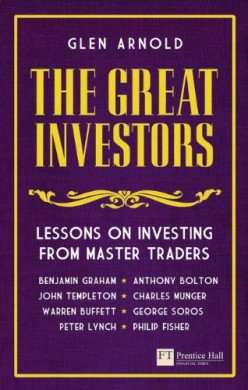As you know, we value investors spend a tremendous amount of time trying to thoroughly understand the businesses we put money into. This has a number of aspects, including:

.
- The quality of the business in terms of competitive/strategic positioning. Does it have any pricing power, something special that allows a good gap between costs and prices charged to customers, allowing high rates of return on capital employed? Maybe that is “share of mind” (implanted in people is a willingness to pay a high price because of perceived extra benefits, say champagne or branded dog food). Maybe it is uniqueness of a service, e.g. the only quarry in 100 miles. Maybe it is special positioning, e.g. owning an acre in the centre of Birmingham.
- The quality of the managers. This has two aspects (1) competence (how well have they run the business?) (2) integrity with regard to treating shareholders well (do they put shareholders first?)
- Financial stability. This has two aspects (1) are the operations of the business reasonable stable and predictable? So, a bio-tech company betting everything on the next discovery would not pass whereas an engineering company with established products and a sound reputation that has shown consistently rising profits over ten years and is expected to continue in that vein would pass. Another example of a question you might ask: is it dependent on one or two customers? (2) Financial stability, e.g. does it have high borrowing making it vulnerable in the next downturn? Does it have big rental commitments?
We value investors also like exploiting the foibles of Mr Market. Buy sound businesses with excellent managers and finances when Mr Market is depressed and selling at low prices. Buy at a price which allows a good margin of safety relative to intrinsic value.
Business or managers?
A question frequently asked of value investors is “When you’re evaluating a company for a potential investment, what do you place the most emphasis on — the business or the management?
Here is Charlie Munger, “We like the business great first. Then, second, we want a great manager. But we have not made a huge success by investing in great managers who take over lousy businesses. That is not the way we rose. If you’re a lousy manager, you really need a great business.”
He added ““Don’t bail away in a sinking boat if you can swim to one that is seaworthy.”
Can a great business be run by a lousy manager?
Warren and Charlie invested over $1.3bn in Coca-Cola shares over the seven years to 1994 via Berkshire Hathaway. Those shares are now worth $25bn. The dividend received by Berkshire in 2022 alone was $704m.
Because it was such a great economic franchise with terrific competitive advantages which could be sustained through periods of poor management Munger concludes that great businesses can be run by lousy managers and still thrive in the long run.
He recalls: “Sometimes. Coca-Cola was run for years by a man with very severe mental impairment. The directors just assumed he was drunk and let him stay there year after year. Now, that’s my idea of a wonderful business — you can be mentally defective and run it pretty well. That was Coca-Cola in its heyday.”
That is quite some test for the shares in your portfolio: could the company be run by someone who is mentally defective and still retain its franchise?
This hurdle is too high because you would end up with too few companies to be sufficiently diversified, but it’s nice if you can find a few of these amazing companies in an investing lifetime to put into a portfolio – but only if you can buy at the right price, so a lot of patience is required.
Prof Glen Arnold now offers a Managed Portfolio Service at Henry Spain Investment Services under which clients’ portfolios contain the same shares as his (write to Jackie.Tran@henryspain.co.uk)














